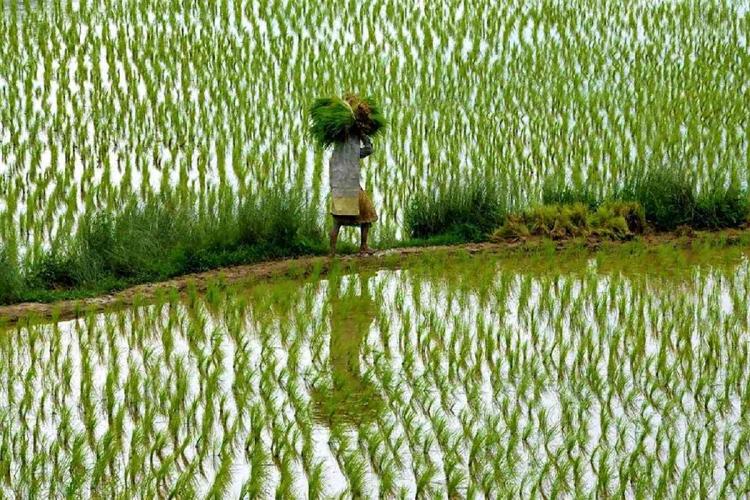
Why TN delta farmers continue to struggle with short-term cropping
When people from non-farming background in Tamil Nadu are participating in protests to express solidarity with the farmers from Punjab against the Centre’s new farm laws, the real farmers are struggling to drain the flood water from their paddy fields in the delta districts of the state.

When people from non-farming background in Tamil Nadu are participating in protests to express solidarity with the farmers from Punjab against the Centre’s new farm laws, the real farmers are struggling to drain the flood water from their paddy fields in the delta districts of the state. While the former fights against the government, the latter, against nature.
In Tamil Nadu, as per the 2012-13 survey of National Sample Survey Office (NSSO), the estimated number of agricultural households is 32.44 lakh, according to the policy note of the state agriculture department. And, it adds that, as per the 10th Agriculture Census in 2015-16, the number of operational land holders in the state is 79.38 lakh, operating culturable land of 59.73 lakh hectare.
It is to be noted that about 93% of the total land holders are small (2 hectare) and marginal (1 hectare) farmers and they operate 62% of the total culturable land. Though the state has nearly 60 lakh hectare operating culturable land, only 44,000 hectares are used for agriculture. In four Cauvery delta districts – Thanjavur, Tiruvarur, Nagapattinam and Myladuthurai alone 22 lakh acres of land is used for agriculture and the main crop is paddy.
Related News: TN farmers await Kuruvai subsidy price, delay Samba crop sowing
“The problems in Punjab and Tamil Nadu are different. There, if the mandi system gets affected, farmers are also affected. But here in Tamil Nadu, paddy is the main crop and it is procured by the government for a minimum support price (MSP). After Punjab farmers’ protest, now the farmers here started fearing what if the government stops procuring paddy. Then, if the procurement goes into the hands of corporates, the region which has been announced as ‘Protected Agricultural Zone’, will be affected,” opined PR Pandian, general secretary, Tamil Nadu Cauvery Farmers Association.
As farmers associations in Tamil Nadu are dependent on political parties for support, as of now the protests are organised politically. Only when the farmers in the state face any kind of problem then protests will happen organically, he added.
Decreasing cropping season days
The delta region is called as the “Granary of South India” and once the farmers here used to cultivate paddy in three seasons – Kuruvai (June-July), Samba (August) and Thaladi (September-November). Kuruvai, which means short-term, takes 90 to 120 days of cultivation. Samba and Thaladi take approximately 120 to 180 days.
“But now the days of the cropping seasons are getting reduced. For example, in the past, the Samba season was 180 days. It was gradually reduced to 160 and now it has become 130 to 150 days. So, when the days are decreasing, farmers are going for modern variety short-term crops instead of cultivating traditional paddy varieties which will take 190 days,” said Cauvery Dhanapal, President, Federation of Tamil Nadu Farmers Association.
Water is very important for agriculture. The short-term paddy varieties which are sown in Kuruvai and Samba seasons heavily depend on water from Mettur dam. But, for the last eight years, Samba cropping season has been affected as water was not released from Mettur.
“Either there is no water from Cauvery or we have heavy rainfall and our fields get flooded. This is because of extreme events like an year’s downpour sometimes arrived in a single day,” added Dhanapal.
The short-term crops can be cultivated within 90 days. In order to make more profit, farmers sow immediately with whatever paddy variety is available in the market so that they won’t miss a season.
“But that should not be the case. A farmer must know what kind of paddy variety must be sown in which season. For example, in Kuruvai, short-term paddy variety can be sown. Likewise, in Samba and Thaladi, they can sow medium and long term varieties so that the crops can withstand floods. On the contrary, most of the farmers now sow short-term variety in all seasons,” said Asaithambi, a farmer.
No other option
The farmers have no other option but to continue to depend on short-term varieties.
“Since there is an assurance that the government will procure their paddy, the farmers are not showing interest to opt for long-term varieties. The government does not procure the traditional varieties. Also, those varieties are cultivated on subsistence basis and not in mass production and the yield is also very low,” said Dhanapal.
While the traditional varieties consume less water, inputs and labour, the short-term varieties require more input.
“Erratic climatic conditions and heavy input costs affect farmers. Earlier, the manure and insecticides were prepared by farmers themselves. That requires a heavy physical labour. So, they are now dependent on readymade products. If they start using those chemical additions, the land turns into more and more toxic, which results in heavy chemical usage,” explained Swamimalai R Vimalanathan, general secretary, Thanjavur District Cauvery Farmers Protection Association.
To read the first story in the series, click here: Punjab farmers’ smile belies deeper angst of debt, poor prices
To read the second story in the series, click here: Farmers irked as govt moves to recover ‘wrong’ payouts in PM Kisan scheme
To read the third story in the series, click here: Bengal farmers need reform but not contentious farm laws
To read the fourth story in the series, click here: Telangana govt takes on farm laws to protect its farmer-friendly image
To read the fifth story in the series, click here: Kerala farmers safe for now from new farm laws, but may not be so for long


